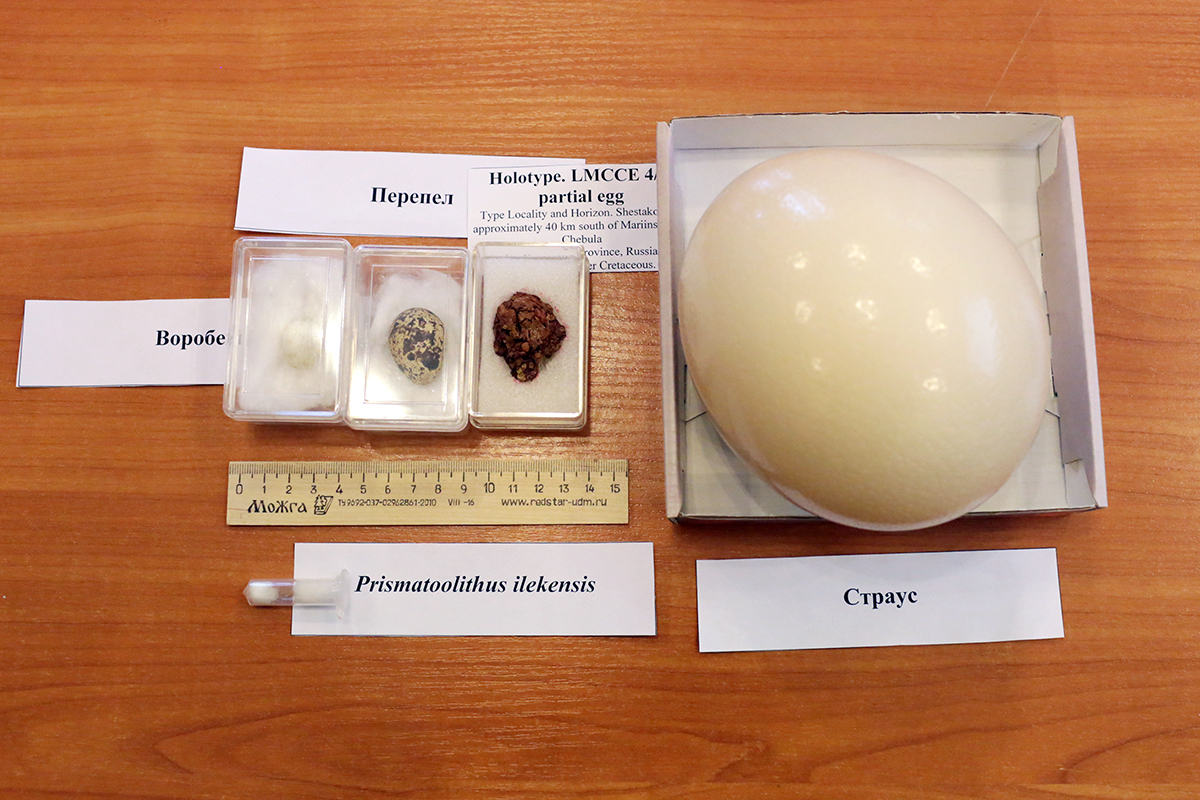Prismatoolithus ilekensis: SPbU’s scientists gave name to first dinosaur egg from West Siberia

The Russian scientists have been exploring the egg of the ancient pangolin, and, for the first time in the recorded history of the Russian paleontology, given it a name.
The new egg is called Prismatoolithus ilekensis to commemorate the Ilek Formation where the discovery was made. The Science-Lunch at St Petersburg University focuses on how the egg was discovered, how long it had been hidden in the ground and what would have hatched out of it.
As long as in 2008, the remains were discovered near the village Shestakovo in Kemerovo region, one of the most well-known places in Russia where dinosaurs could have been found. However, the remains have been just recently studied by the scientists from SPbU, Tomsk State University, Zoological Institute of RAS, and Paleontological Institute named after A.A. Borisiak of RAS. The research findings have been published in Historical Biology. Presumably, the egg is 120 mln year-old and could belong to small predaceous dinosaurs or proto-birds. This is the second discovery of this kind and the most ancient egg that has been found in Russia.
“The research shows that Shestakovo is a place that has a scientific potential to discover the eggs of the dinosaurs, — said SPbU Associate Professor, expert in the Mesozoic vertebrates Pavel Skuchas. — Today we are performing massive excavation works there and probably we will discover other eggs or an egg with an embryo inside. We will therefore get a whole picture and know what animal had laid the egg”.
What dinosaur had laid the egg is a hard nut to crack for the scientists yet, however the scientists tend to think that the “mother” has been a female of the predaceous dinosaur-theropod from the family of the troodontidae.
These predators are similar to our birds: they had been feathered, looked like big birds and of one-meter height. The egg is not big in size: 2 cm in cross section and about 4 cm long at most. The embryo has not been preserved: presumably, the egg mass had been destroyed during the seasonal flood.
The scientists have made only one discovery of this kind in Russia. In 2009, the paleontologists headed by Pascal Godefroit discovered the fragments of the eggshell in Chukotka. Although the remains from Shastakovo were discovered earlier, Pascal Godefroit's group of scientists is regarded as the first scientists who discovered the dinosaur eggs in Russia, as they were the first to publish their research findings. The discovery from Kemerovo region is equally valuable: 2/3 of the egg is well preserved and it is 50 mln years older than the remains from Chukotka.
Apart from Pavek Skuchas, the research project “Prismatoolithus ilekensis” consists of Valentina Makarova, Ecological and Biological Centre “Krestovskii Ostrov”, Elizaveta Boitsova, graduate students at SPbU, Sergei Leshchinskii, head of the Laboratory of the Continental Ecosystem of the Mesozoic Era Cenozoic Era from Tomsk University, Stepan Ivantsov, scientific fellow from Tomsk University, Aleksandr Averianov, head of the Laboratory of the theriology of the Zoological Institute of RAS, and Evgenii Mashchenko, senior scientific fellow of the Paleontological Institute named after A.A. Borisiak of RAS. It was Evgenii Mashchenko who discovered the egg while examining more closely the surroundings near the excavation area. Valentina Makarova, a school student from St Petersburg and whose teacher is Pavel Skuchas, has significantly contributed to the research: she was responsible for examining the structure of the egg and could identify its taxonomic type.
“We confronted a serious challenge as we had to identify the taxonomy of the egg, — said Valentina Makarove. — We had to describe the structure of the egg and performed a comparative analysis. We made micro-slices of the eggshell of 50 micrometres in size and studied them under the microscope. The slices showed us that the egg had three layers and hollow canals to ensure that the embryo could breathe”.
What the scientists discover helped understand that the egg had been laid by troodontidae that are “transition” species between dinosaurs and modern birds. The research was carried out at the SPbU’s Research Park. The egg is now presented in the collections of the University, but it will be soon sent to Tomsk for further research.

